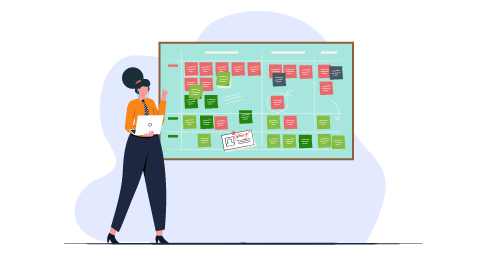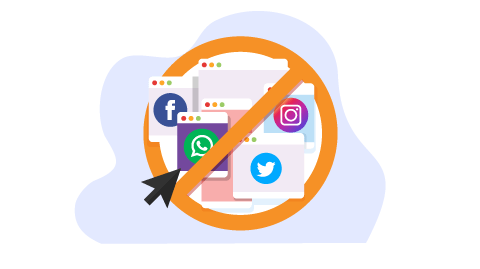9 Time Management Techniques For Better Engagement
Time is what we want most, but what we use worst. - William Penn
Time, as we all know, is precious and valuable for everyone. In this fast-paced world, maintaining a schedule and keeping up with changes has become difficult.
This is why facilitating room for time management techniques is crucial.
With constant transformation going all around, the workload has increased. This has made it hard for you and your employees to maintain a work-life balance. And people have little knowledge about managing time.
But it all comes down to the fact about how well you or your employees the 24- hour day?
In this article, we will discuss how one can manage time to maximize productivity.
What is Time Management?
The bad news is time flies. The good news is you’re the pilot. -Michael Altshuler
Time management is about planning and organizing the time you will spend on specific activities. The main purpose is to increase efficiency and productivity.
Effective time management enhances success rate at work and in life.
Practicing time management saves your valuable time and improves the use of time.
The availability of an effective time management program enables the correct use of time. In return, it improves productivity and engagement.
And to have an effective time management schedule, first, you need to follow the four Ds of effectiveness. They are:
Desire: Effective time management is only possible when there is the desire to understand the value of time. Acknowledging it can boost your confidence when you manage it well.
Determination: There will be distractions in your way during your essential tasks, which will eventually result in time getting wasted. But your determination to avoid distractions will be the critical inappropriate time management.
Decisiveness: You must have a strong sense of determination about practicing good time management practices until it becomes a regular and everyday habit. You have to decide this practice is going to make you a better person further in life.
Discipline: Finally, the fourth D is discipline. It is one of the most important and crucial factors for better time management. Maintaining discipline will give you an idea about what you need to do and when to do them. Discipline helps you maintain a routine schedule that you would follow without indulging yourself in tasks that consume your time and efforts.
Effective Time Management Techniques
Now that we have discussed the four D’s of time management, let us look at the following time management techniques.
1. Delegation:

You might have faced situations when your employees face the crunch of completing their work and projects. When such a situation arises, the not-so-essential tasks get piled up.
This increases their workload, and thus, managing time for the pending work becomes a hassle.
To avoid this, you can ask your employees to break the job into segments and delegate the tasks. This will help them manage their time and complete the job faster and better within the team.
2. Prioritizing:

Without proper guidance, employees might lose track of their goals and deviate from their duties. And with the growing corporate world, keeping up with changes can be a difficult task. Having SMART goals is not enough if you don't focus on achieving those.
To manage time well, you can ask your employees to prioritize their vital tasks at first. This way, they will learn how to use the time to complete critical tasks and improve their work rate.
As Stephen Covey quoted, ‘The key is not to prioritize what's on your schedule but to schedule your priorities.’
3. Autonomy:

Giving your employees autonomy increases not only their productivity but also improves their engagement. Every employee has a comfort zone and ways to do their job.
Some employees like to do their tasks the hard way, and some resort to easy methods.
It is crucial to keep in mind that as long as the job gets done in time, you should not interfere with their ways of doing things. When you provide autonomy, your employees will value time. They will be less distracted from interference and give more time to their work.
This way, they are likely to save up and manage time in their way.
4. Planning the day in advance:

Every employee likes to have their whole day sorted out instead of getting stuck to one thing. If everything is not sorted out before the day starts, then there might come such times where employees might feel that they are lost.
Eventually getting frustrated and burned out. And the best way to avoid it is to plan the whole day out. It is one of the most essential and proven techniques of time management.
Firstly, it allows them to organize their day; secondly, it gives them detailed insights into the things they need to do. Planning the day makes it easy to complete one task at a time more efficiently and sincerely.
5. Limiting Email check:

When you start your day at work, checking relevant emails is essential. But when your mail inbox gets crowded with unnecessary and spam messages, it becomes challenging to pick out the important ones.
Statistics have said that an average worker spends about 30 hours a week checking their email. That is a whole lot of working hours.
To avoid wasting those hours of work in emails, you can limit checking emails to only those which need an immediate response. And the rest you can keep track of during your free hour without wasting time or at the end of the day.
You can apply filters that mark your important emails and dump those "spammy" ones.
6. Preventing Distractions:

Social media, pop-up texts, notifications, emails, and your colleagues pull your attention away from work. And to be more engaged in your job, you need to block these distractions. They take up too much of your time, and your work gets piled up.
Learn to say no to your colleagues when you are between your work. Turn off notifications and put away your phone. But most importantly, stay focused on what you are doing. Limit yourself from indulging in tasks that limit your productivity.
When you get invested in your work, you will manage more time by completing it before the deadline day hovers over you.
7. Maintaining a Structure:

You will accomplish your daily task in a time when you follow a rigid structure. This is why it is essential to plan out a schedule and sort out the time you will need to complete each task.
A predetermined time will allow you to prepare mentally for the day and dedicate the time to complete the job. This will help you in bringing out more efficiency and increase productivity throughout the day.
Helping you and the organization manage time well without hindering the flow of work.
8. Focus on one task:

Managing the time you have is an integral part of your life. Because time is precious and irreplaceable, it is essential to complete the task you have in hand.
Always try to focus on doing one task at a time so that there is no room for error. If you complete your job in a rush, there are chances that you will have to again invest more time on the mistakes.
It will be a learning process, but there will be a significant loss of time. This is why do one task at a time for better efficiency. And do not resort to multitasking which might hinder the job at hand.
9. Using Time Management Tools:

Technology has taken over the world in every sector. The corporate environment has also embraced the changes going around. The digital transformation has not only made life easy for everyone, but it has also made time management smooth.
There is an abundant number of tools present that you can use to make full use of your time. Tools that focus on:
-
Time tracking: Keeps track of your time and how much you have spent completing one task using a desktop time tracker.
-
To-Do list: Helps you focus on organizing your work and schedule everything according to your day.
-
Communication: This Lets you create streamless connectivity within your organization without leaving your table, helping you save time.
-
Logging: Helps you create a spreadsheet about all the work you have done or the pending work. And according to that, you can plan your schedule.
Not Difficult, Just be Consistent:
Managing time is a habit that can be burdensome and can drain your energy. But once you get the knack of having charge of the time you spend, you will see the sweet fruit it bears.
All you need to do is be consistent in your practice in having adequate time management skills. Skills that will make you disciplined in your life and in your workplace. Apply these simple time management tips and see the difference it makes in improving your efficiency at your workplace.

















